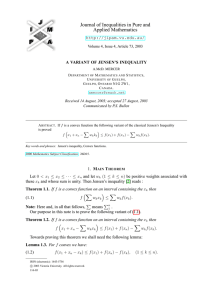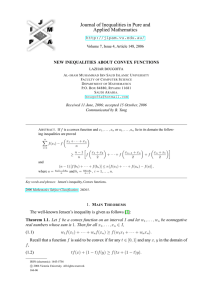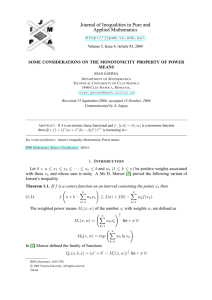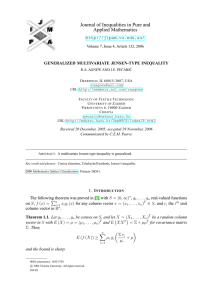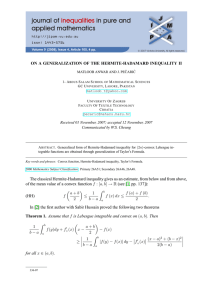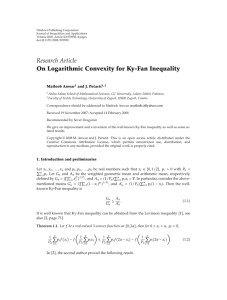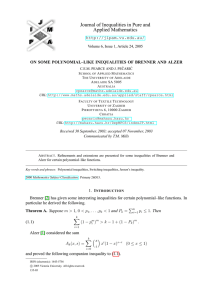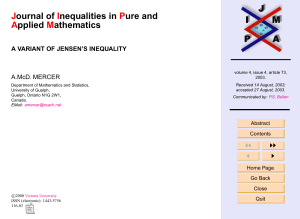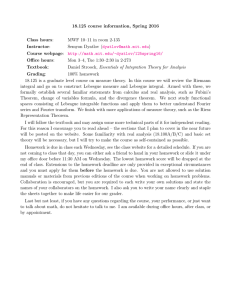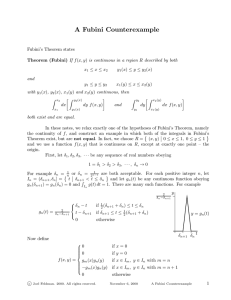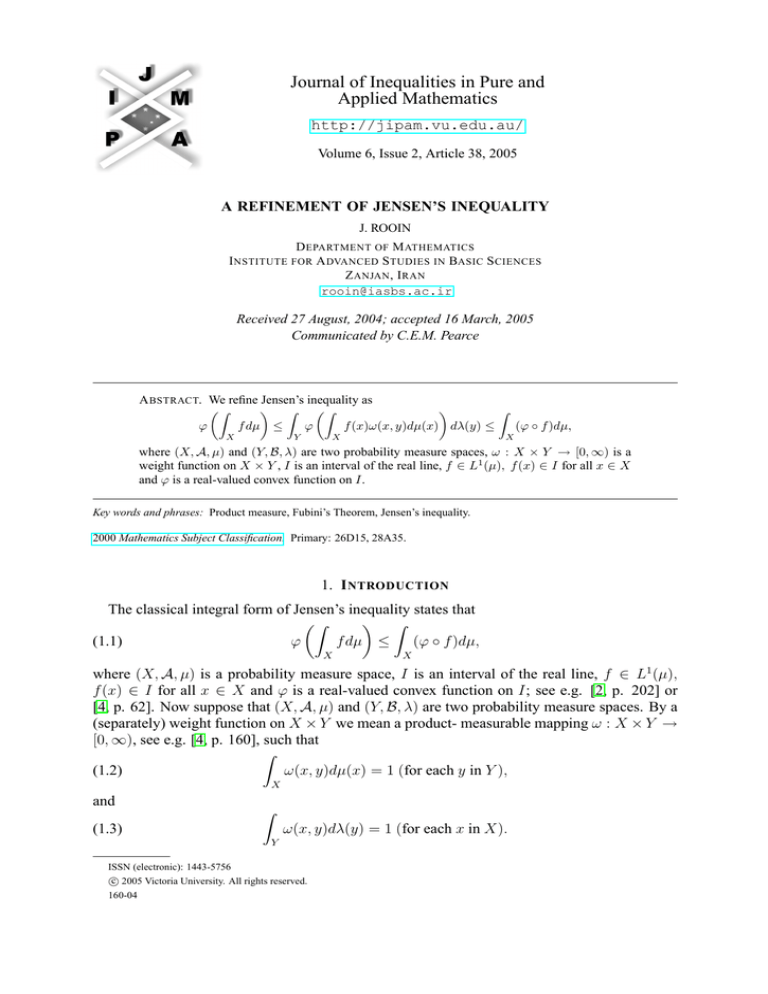
Journal of Inequalities in Pure and
Applied Mathematics
http://jipam.vu.edu.au/
Volume 6, Issue 2, Article 38, 2005
A REFINEMENT OF JENSEN’S INEQUALITY
J. ROOIN
D EPARTMENT OF M ATHEMATICS
I NSTITUTE FOR A DVANCED S TUDIES IN BASIC S CIENCES
Z ANJAN , I RAN
rooin@iasbs.ac.ir
Received 27 August, 2004; accepted 16 March, 2005
Communicated by C.E.M. Pearce
A BSTRACT. We refine Jensen’s inequality as
Z
Z
Z
Z
ϕ
f dµ ≤
ϕ
f (x)ω(x, y)dµ(x) dλ(y) ≤
(ϕ ◦ f )dµ,
X
Y
X
X
where (X, A, µ) and (Y, B, λ) are two probability measure spaces, ω : X × Y → [0, ∞) is a
weight function on X × Y , I is an interval of the real line, f ∈ L1 (µ), f (x) ∈ I for all x ∈ X
and ϕ is a real-valued convex function on I.
Key words and phrases: Product measure, Fubini’s Theorem, Jensen’s inequality.
2000 Mathematics Subject Classification. Primary: 26D15, 28A35.
1. I NTRODUCTION
The classical integral form of Jensen’s inequality states that
Z
Z
(1.1)
ϕ
f dµ ≤
(ϕ ◦ f )dµ,
X
X
where (X, A, µ) is a probability measure space, I is an interval of the real line, f ∈ L1 (µ),
f (x) ∈ I for all x ∈ X and ϕ is a real-valued convex function on I; see e.g. [2, p. 202] or
[4, p. 62]. Now suppose that (X, A, µ) and (Y, B, λ) are two probability measure spaces. By a
(separately) weight function on X × Y we mean a product- measurable mapping ω : X × Y →
[0, ∞), see e.g. [4, p. 160], such that
Z
(1.2)
ω(x, y)dµ(x) = 1 (for each y in Y ),
X
and
Z
ω(x, y)dλ(y) = 1 (for each x in X).
(1.3)
Y
ISSN (electronic): 1443-5756
c 2005 Victoria University. All rights reserved.
160-04
2
J. ROOIN
For example, if we take X and Y as the unit interval [0, 1] with Lebesgue measure, then
ω(x, y) = 1 + (sin 2πx)(sin 2πy) is a weight function on [0, 1] × [0, 1].
In this paper, using a weight function ω, we refine Jensen’s inequality (1.1) as in the following
section. For some applications in the discrete case, see e.g. [3].
2. R EFINEMENT
In this section, using the terminologies of the introduction, we refine the integral form of
Jensen’s inequality (1.1) via a weight function ω.
Theorem 2.1. Let (X, A, µ) and (Y, B, λ) be two probability measure spaces and ω : X ×Y →
[0, ∞) be a weight function on X × Y . If I is an interval of the real line, f ∈ L1 (µ), f (x) ∈ I
for all x ∈ X, and ϕ is a real convex function on I, then
Z
Z
ϕ
Y
f (x)ω(x, y)dµ(x) dλ(y)
X
has meaning and we have
Z
(2.1)
≤
f dµ
ϕ
Z
Z
X
ϕ
Z
f (x)ω(x, y)dµ(x) dλ(y) ≤
(ϕ ◦ f )dµ.
X
Y
X
Proof. The functions ω and (x, y) → f (x), and so
(x, y) → f (x)ω(x, y)
is product-measurable on X × Y . Now since
Z Z
(2.2)
X
Y
|f (x)|ω(x, y)dλ(y)dµ(x)
Z
Z
=
|f (x)|
ω(x, y)dλ(y) dµ(x)
Y
X
Z
=
|f (x)|dµ(x) = kf kL1 (µ) < ∞,
X
by Fubini’s theorem, the real-valued function (x, y) → f (x)ω(x, y) on X × Y belongs to
L1 (µ × λ). Therefore for λ-almost all y ∈ Y , the function x → f (x)ω(x, y) belongs to L1 (µ).
Fix an arbitrary α ∈ I. Define F : Y → R, by
Z
f (x)ω(x, y)dµ(x)
F (y) =
X
if the integral exists, and F (y) = α otherwise. By Fubini’s theorem, we have F ∈ L1 (λ). It is
easy to show that F (y) ∈ I (y ∈ Y ). So,
Z
Z
ϕ
Y
Z
f (x)ω(x, y)dµ(x) dλ(y) := (ϕ ◦ F )(y)dλ(y)
X
J. Inequal. Pure and Appl. Math., 6(2) Art. 38, 2005
Y
http://jipam.vu.edu.au/
A R EFINEMENT OF J ENSEN ’ S I NEQUALITY
3
has meaning and is an extended real number belonging to (−∞, +∞]; see e.g. [4, p. 62]. Now,
since (x, y) → f (x)ω(x, y) belongs to L1 (µ × λ), by (1.1) and Fubini’s theorem, we have
Z
Z
Z
ϕ
f (x)ω(x, y)dµ(x) dλ(y) = (ϕ ◦ F )(y)dλ(y)
X
Y
Y
Z
F (y)dλ(y)
≥ϕ
Y
Z Z
=ϕ
f (x)ω(x, y)dµ(x)dλ(y)
Y X
Z
Z
=ϕ
f (x)
ω(x, y)dλ(y) dµ(x)
X
Y
Z
=ϕ
f dµ ,
X
and the left-hand side inequality (2.1) is obtained.
R
For the right-hand side inequality in (2.1), we consider two cases: If X (ϕ ◦ f )dµ = +∞,
the assertion is trivial. Suppose then, ϕ ◦ f ∈ L1 (µ). Take an arbitrary y ∈ Y such that
x → f (x)ω(x, y) belongs to L1 (µ), and put
dν y = ω y dµ,
where
ω y (x) = ω(x, y)
(x ∈ X).
y
Trivially, (X, A, ν ) is a probability measure space, f ∈ L1 (ν y ) and
Z
Z
F (y) =
f (x)ω(x, y)dµ(x) =
f (x)dν y (x).
X
X
Thus, by Jensen’s inequality (1.1), we have
Z
Z
y
(2.3)
(ϕ ◦ F )(y) = ϕ
f (x)dν (x) ≤
(ϕ ◦ f )dν y .
X
X
1
Since ϕ ◦ f ∈ L (µ),
Z Z
X
Y
(2.4)
|(ϕ ◦ f )(x)|ω(x, y)dλ(y)dµ(x)
Z
Z
=
|(ϕ ◦ f )(x)|dµ(x) ω(x, y)dλ(y)
X
Y
Z
=
|(ϕ ◦ f )(x)|dµ(x) < ∞,
X
and so for λ-almost all y ∈ Y , the function x → (ϕ ◦ f )(x)ω(x, y) belongs to L1 (µ) and for
these y’s, we have
Z
Z
(2.5)
(ϕ ◦ f )(x)ω(x, y)dµ(x) =
(ϕ ◦ f )(x)dν y (x).
X
X
Thus, by (2.3) and (2.5), for λ-almost all y ∈ Y
Z
(ϕ ◦ f )(x)ω(x, y)dµ(x).
(2.6)
(ϕ ◦ F )(y) ≤
X
Denote temporarily the right-hand side of (2.6) by ψ(y) (put ψ(y) = 0, if the integral does
R not
1
+
+
exist). Since
(2.4), ψ ∈ L (λ), from (ϕ ◦ F ) ≤ ψ (λ-a.e.), we conclude that Y (ϕ ◦
R by
+
+
F ) dλ ≤ Y ψ dλ < ∞.
J. Inequal. Pure and Appl. Math., 6(2) Art. 38, 2005
http://jipam.vu.edu.au/
4
J. ROOIN
R
On the other hand, we know that Y (ϕ ◦ F )− dλ < ∞. Thus ϕ ◦ F ∈ L1 (λ), and so by (2.6),
(2.4) and Fubini’s theorem,
Z
Z
Z
ϕ
f (x)ω(x, y)dµ(x) dλ(y) = (ϕ ◦ F )(y)dλ(y)
Y
X
ZY
≤
ψ(y)dλ(y)
Y
Z Z
=
(ϕ ◦ f )(x)ω(x, y)dµ(x)dλ(y)
Y X
Z
Z
=
(ϕ ◦ f )(x)dµ(x) ω(x, y)dλ(y)
X
Y
Z
=
(ϕ ◦ f )dµ.
X
This completes the proof.
Corollary 2.2. If ϕ is a real convex function on a closed interval [a, b], then we have HermiteHadamard inequalities [1]:
Z b
a+b
1
ϕ(a) + ϕ(b)
≤
ϕ(t)dt ≤
.
(2.7)
ϕ
2
b−a a
2
Proof. Put X = {0, 1} with A = 2X and µ{0} = µ{1} = 12 , and Y = [0, 1] with Lebesgue
measure λ. Now, (2.7) follows from (2.1) by taking ω(0, y) = 2(1 − y), ω(1, y) = 2y (0 ≤
y ≤ 1), I = [a, b], f (0) = a, f (1) = b, and considering the change of variables t = (1 − y)a +
yb.
We conclude this paper by the following open problem:
Open problem. Characterize all weight functions. Actually, if ω(x, y) is a weight function,
then θ(x, y) = ω(x, y) − 1 satisfies the following relations:
Z
(2.8)
θ(x, y)dµ(x) = 0 (for each y in Y ),
X
Z
θ(x, y)dλ(y) = 0 (for each x in X).
(2.9)
Y
So precisely, the weight functions are of the form 1 + θ(x, y) with nonnegative values such that
θ(x, y) is product-measurable and satisfies (2.8) and (2.9). Therefore, it is sufficient only to
characterize these θ’s.
R EFERENCES
[1] S.S. DRAGOMIR AND C.E.M. PEARCE, Selected Topics on Hermite-Hadamard Inequalities and
Applications, RGMIA Monographs, Victoria University, 2000. [ONLINE: http://rgmia.vu.
edu.au/monographs/]
[2] E. HEWITT AND K. STROMBERG, Real and Abstract Analysis, Springer-Verlag, New York, 1965.
[3] J. ROOIN, Some aspects of convex functions and their applications, J. Ineq. Pure and Appl. Math.,
2(1) (2001), Art. 4. [ONLINE http://jipam.vu.edu.au/article.php?sid=120]
[4] W. RUDIN, Real and Complex Analysis, 3rd ed., McGraw-Hill, New York, 1974.
J. Inequal. Pure and Appl. Math., 6(2) Art. 38, 2005
http://jipam.vu.edu.au/

